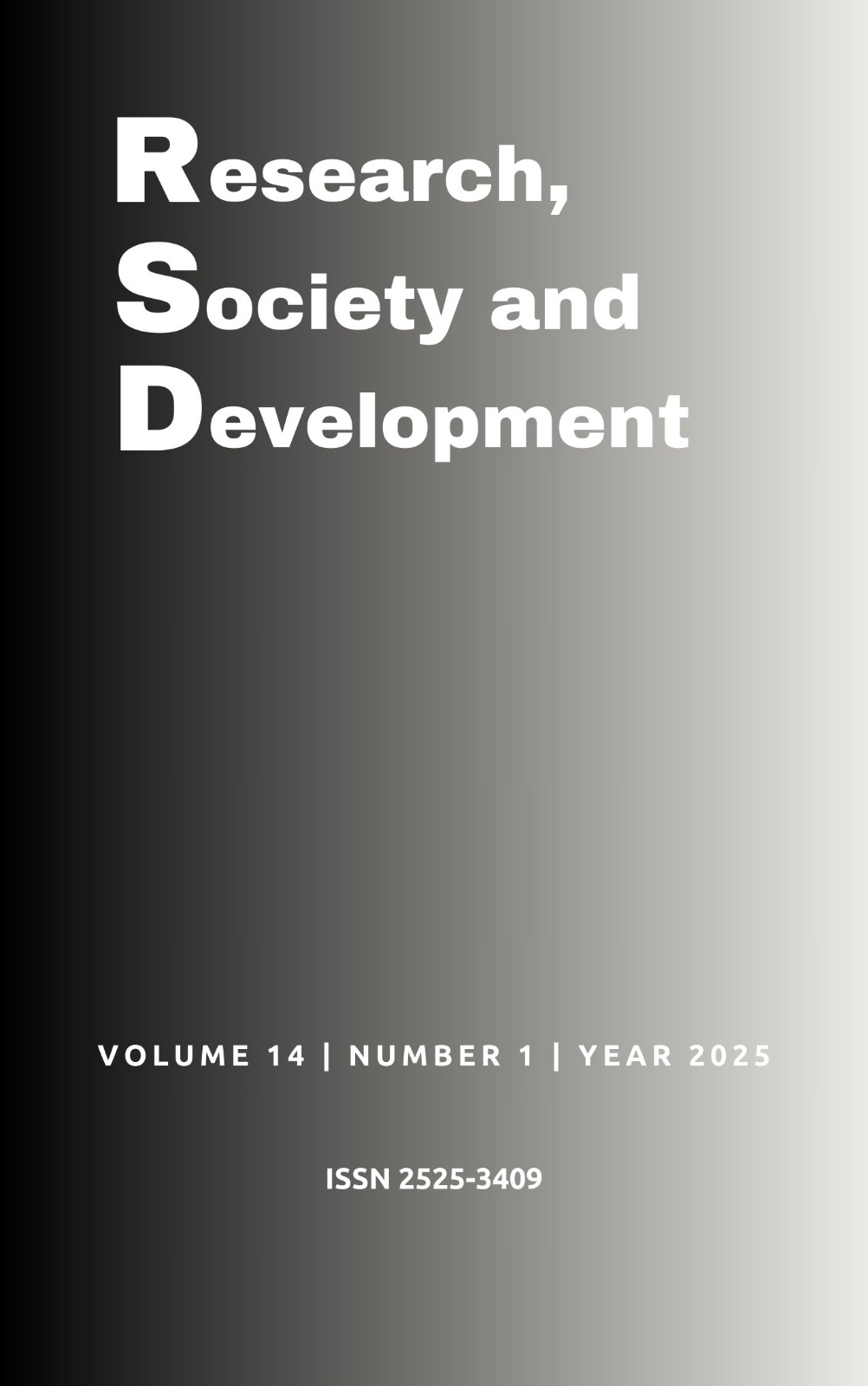Epidemiological profile of patients hospitalized for alcohol dependence in a private psychiatric clinic in Cascavel, Paraná State (PR), Brazil
DOI:
https://doi.org/10.33448/rsd-v14i1.48016Keywords:
Alcoholism, Dependence, Addiction, Alcohol.Abstract
Objective: The objective of this article was to identify factors that converge in relation to the profile of patients affected by alcohol dependence and, thus, facilitate the search for actions that aim to reduce this disease. Methodology: The information for this study was obtained through the analytical-observational method, through the analysis of medical records in a private psychiatric clinic in the city of Cascavel, in the state of Paraná (PR), Brazil, and data found on age, sex, length of stay in a psychiatric institution and diseases associated with the main diagnosis: mental and behavioral disorder due to alcohol use - dependence syndrome were tabulated. Conclusion: The majority presence of males was significant, unlike age, which did not demonstrate significant prevalence. Regarding the associated diseases, the most commonly found were mental and behavioral disorders due to cocaine use and bipolar affective disorder. Regarding the length of stay in the clinic, the study demonstrated that the majority followed the 3-month hospitalization standard (allowed by Brazilian legislation in cases of involuntary hospitalization) and were discharged close to this period. Furthermore, it was possible to observe that such data converge with studies present in the literature, demonstrating that the epidemiological profile found has similarities between other regions of the world.
Downloads
References
Alves H., Kessler F. & Ratto L. R. C. (2004). Comorbidade: uso de álcool e outros transtornos psiquiátricos. Brazilian journal of psychiatry.
American Psychiatric Association, (2014). Diagnostic and statistical manual of mental disorders (dsm-5). (5a ed.). Editora Artmed.
Eva, L. et al., (2023). Neuropsychiatric and neuropsychological aspects of alcohol-related cognitive disorders: an in-depth review of wernicke’s encephalopathy and korsakoff’s syndrome. Journal of clinical medicine. v. 12.
Becker, H. C. (2008). Alcohol dependence, withdrawal, and relapse. Alcohol research & health.
Filho, J. M. N., Linhares, M. M., Aragão, R. P., Sousa, R. P. D. A., & Rocha, N. S. P. D. (2021). Perfil epidemiológico dos usuários atendidos em centro de atenção psicossocial, álcool e drogas, em uma capital do nordeste brasileiro. Revista ciência plural.
Koob, G. F. & Volkow, N. D. (2010). Neurocircuitry of addiction. Neuropsychopharmacology.
Lima, Á. L. O., Neto, J. L. S., Franco, J. V. V., Valent,e G. G. T., Barbosa, J. M., Lobo, G. S., Rosa, G. M. A., Lemos, A. R., Viana, Y. C., & Montes, A. S. (2022). Transtornos psiquiátricos relacionados ao uso do álcool. Research, society and development, v. 11.
Lucas, D. L., Brown, R. A., Wassef, M., & Giles, T. D. (2005). Alcohol and the cardiovascular system: research challenges and opportunities. Journal of the american college of cardiology.
Maciel, C., & Kerr-corrêa, F. (2004). Complicações psiquiátricas do uso crônico do álcool: síndrome de abstinência e outras doenças psiquiátricas. Brazilian journal of psychiatry.
Ministério da justiça e segurança pública: secretaria nacional de políticas sobre drogas e gestão de ativos (2021). II relatório brasileiro sobre drogas. MJSP Brasília, DF.
Miranda, A. P., Ventura, R. L. R., Júnior, A. F. S. X., & Lima A. F. (2022). Perfil epidemiológico de indivíduos internados por transtornos mentais e comportamentais devido ao uso do álcool em alagoas. Ciências biológicas e da saúde unit. Alagoas.
Onofre, D. K. A. (2017). Tempo de internação psiquiátrica em instituição de referência no estado de sergipe. Revista científica multidisciplinar núcleo do conhecimento.
Pereira, P. M. B., & Bitencourt, R. M. (2021). Prevalência do transtorno depressivo maior em pessoas com dependência química. Smad revista eletrônica saúde Mental álcool e drogas.
Pereira, A. S. Et al. (2018). Metodologia da pesquisa científica. [free e-book]. Editora Uab/nte/ufsm.
Reilly, M. T. , Noronha, A., Goldman, D., & Koob, G. F. (2017). Genetic studies of alcohol dependence in the context of the addiction cycle. Neuropharmacology.
Santos, J. M. P., Lima, M. V. B. G., & Moraes, A. C. P. (2024). Análise da frequência da ingestão de bebidas alcoólicas entre estudantes de medicina de uma faculdade privada em Minas Gerais. Research, Society and Development, 13(11).
Shitsuka, R. et al. (2014). Matemática fundamental para tecnologia. (2ed.). Editora Erica.
Silva, C. R., Kolling, N. M., Carvalho, J. C. N., Cunha, S. M., & Kristensen, C. H. (2009). Comorbidade psiquiátrica em dependentes de cocaína/crack e alcoolistas: um estudo exploratório. Aletheia
Souza, J. C., Souza, N., & Magna, L. A. (2008). Tempo médio de hospitalização e categorias diagnósticas em hospital psiquiátrico. J bras psiquiatr.
World Health Organization. (2018). Global status report on alcohol and health. Geneva, Switzerland.
Zakhari, S., & Li, Tk. (2007). Determinants of alcohol use and abuse: impact of quantity and frequency patterns on liver disease. Hepatology, v. 46.
Downloads
Published
Issue
Section
License
Copyright (c) 2025 Julia Maria Trevisan; Nathan dos Santos Rocha; Marcelo Rodrigo Caporal; Gabriela Frigotto Colognese; Eduardo Gobo dos Santos; Argonio Bryan Silva de Oliveira

This work is licensed under a Creative Commons Attribution 4.0 International License.
Authors who publish with this journal agree to the following terms:
1) Authors retain copyright and grant the journal right of first publication with the work simultaneously licensed under a Creative Commons Attribution License that allows others to share the work with an acknowledgement of the work's authorship and initial publication in this journal.
2) Authors are able to enter into separate, additional contractual arrangements for the non-exclusive distribution of the journal's published version of the work (e.g., post it to an institutional repository or publish it in a book), with an acknowledgement of its initial publication in this journal.
3) Authors are permitted and encouraged to post their work online (e.g., in institutional repositories or on their website) prior to and during the submission process, as it can lead to productive exchanges, as well as earlier and greater citation of published work.


